Abolishing the position of commune-level veterinary specialist: The benefits do not outweigh the harm.
(Baonghean.vn) - The current situation of livestock and poultry diseases is widespread, however, at the grassroots level there is a lack of veterinary staff, leading to confusion and passivity.
According to Resolution No. 22/2019/NQ-HDND of the Provincial People's Council, from the beginning of 2020, the province no longer has the title of non-professional veterinary and plant protection worker at the commune level. This reality requires changes.
Before the information that in the commune there were sick buffaloes and cowslumpy skin disease(VDNC), Ms. Nguyen Thi Dam in Hoang Vang hamlet, Tan Xuan commune (Tan Ky) hurriedly went to the commune to register to buy vaccines to vaccinate her family's two cows.
“I only dare to raise two, even though the barn is clean and spacious. Before, if the buffalo or cow got sick, I would report it and the officials would come to check it right away, but now there are many new types of diseases, and the commune no longer has veterinary staff. If the cattle get sick, I don’t know who to call,” Ms. Dam worried.
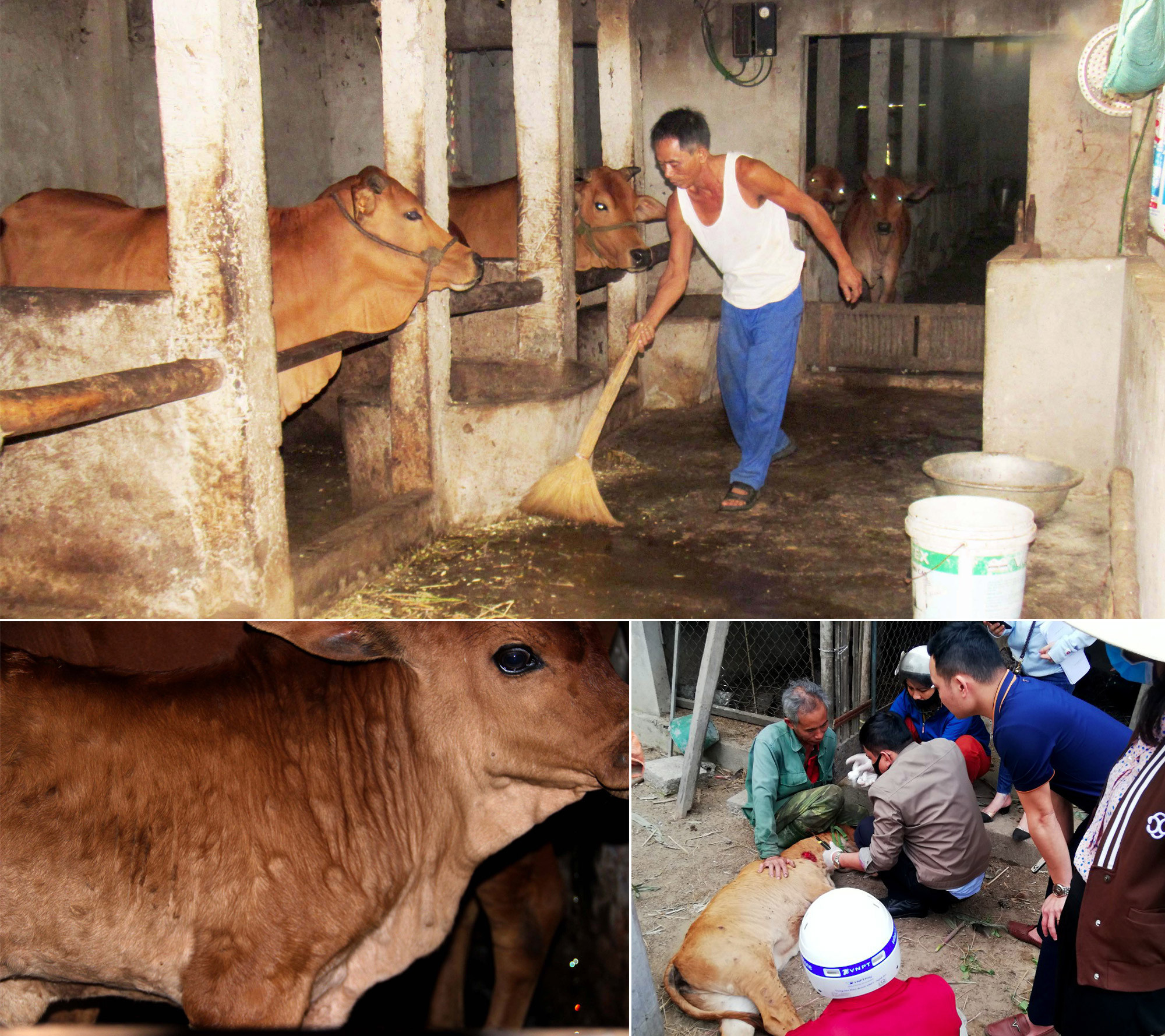 |
| Lumpy skin disease in buffaloes and cows has appeared in many localities in recent times. Photo: Quang An |
Currently, in Tan Xuan commune, there has been an outbreak of the disease.African swine fever(DTLCP) and VDNC in buffaloes and cows. Although the commune has taken drastic measures and established working groups to go to each household to isolate and suppress the epidemic, it still faces many difficulties in detecting and controlling it. "Without veterinary staff, the commune had to hire veterinary experts in the area, but most of them did not want to accept because they were afraid of the responsibility after vaccination and many people did not cooperate with the vaccination.
“The rental price is very expensive, 500,000 VND/person/day and each vaccination team must have 2-3 people; without any source of funding, the commune has to draw from the regular and reserve budget, while Tan Xuan commune is a poor commune; not only that, the payment and settlement is also very difficult because this source of funding is not included in any list. The epidemic is continuous, the cost of hiring veterinary staff to prevent and control the epidemic is higher than the allowance for commune veterinary staff, which is over 1 million VND/month and veterinary staff, which is 200,000 VND/month.”
Having no expertise in veterinary medicine, since being assigned to take charge of this field, Ms. Le Thi Na - an agricultural officer of Ngoc Son commune (Thanh Chuong) has often found herself in a confusing situation, especially during epidemics.
“If before, just deliveryveterinary staff"When I go to collect samples and diagnose diseases, now every time there is an epidemic, the Commune People's Committee has to hire and contract a specialist. I follow along to both fight the epidemic and gradually learn" - Ms. Na said. However, hiring people is also very difficult.
 |
| Since the beginning of 2021, African swine fever has re-emerged in 28 communes in Thanh Chuong district. Photo: Xuan Hoang |
When she cannot hire people or does not have enough, she has to rely entirely on guidance and support from the district level, while the number of staff at the District Agricultural Service Center is not enough to promptly meet this need for the communes, especially during widespread epidemics.
“Without commune veterinarians, the ability to assess and assess the situation, especially to implement vaccination and disease prevention is very difficult. Most of the agricultural staff of 39 communes and towns in the area are specialized in cultivation, not trained in veterinary medicine, so they are very confused in disease control and livestock development. Recently, African swine fever and lumpy skin disease have broken out. From January 1 to now, ASF has occurred in 1,693 households in 184 villages and hamlets of 36 communes, with about 300 tons of pigs dead and destroyed; ASF in buffalo and cows has occurred in 30 communes, in 161 households in 62 villages and hamlets with 187 sick pigs. Mobilizing veterinary forces to join local authorities in fighting the epidemic is very difficult. Meanwhile, for Thanh Chuong district, agriculture is still the key "front", livestock is one of the main sources of income for the people”.
Many potential problems
With a large area and developed livestock farming, the disease situation in Nghe An's livestock herds is always complicated. Just counting from the beginning of the year until now,ASF has occurred in 1,762 households in 19 districts, with the total number of pigs destroyed reaching nearly 5,000. Currently, there are over 100 outbreaks in the province; the outbreaks all arose from old outbreaks in 2019 and 2020 and occurred sporadically in small-scale farming households.
In addition, the African swine fever epidemic first appeared in Van Loi commune (Quy Hop) and reappeared on February 10, 2021. In a short time, the African swine fever epidemic in buffaloes and cows has caused damage in 19 districts, cities and towns. Some outbreaks have developed complicatedly, with a large number of buffaloes and cows infected, such as Vinh Son commune (Anh Son); Quynh Xuan ward (Hoang Mai town)...
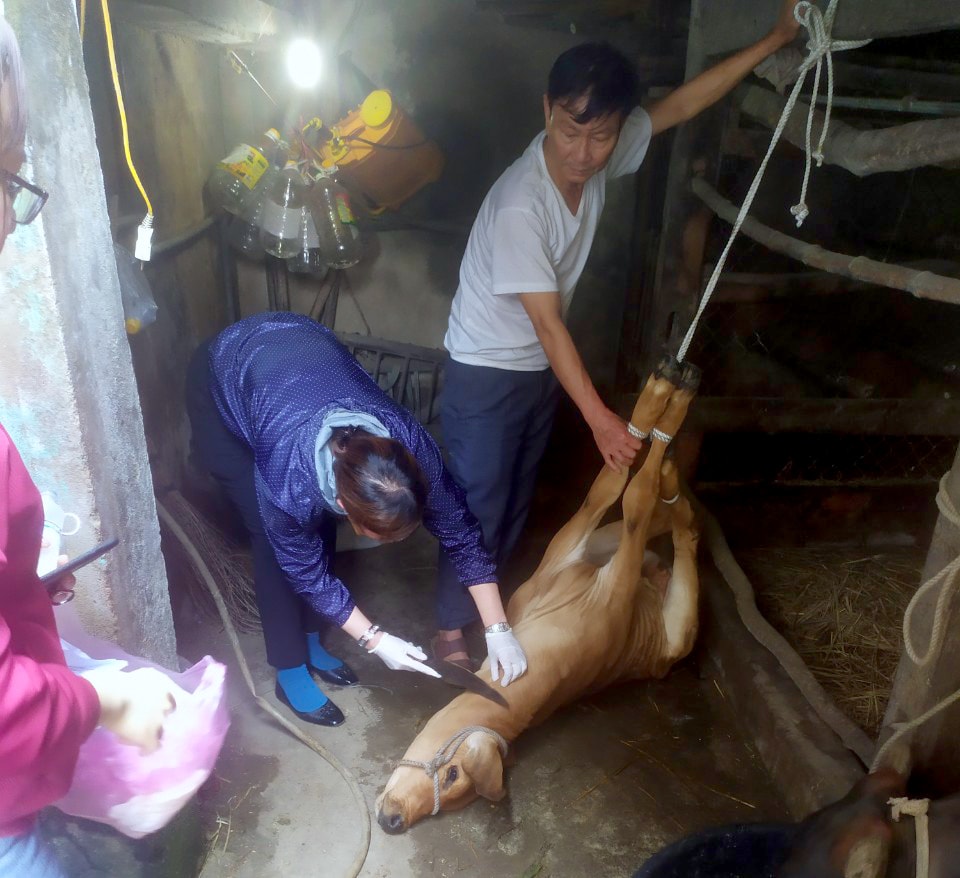 |
| Vinh City authorities take samples of buffaloes and cows showing symptoms of VDNC. Photo: QA |
According to Mr. Dang Van Minh - Head of the Department of Animal Husbandry and Veterinary Medicine, Nghe An is a province with a large herd of livestock and poultry, but the main form of livestock farming is small-scale, household farming; the volume of transportation, slaughtering, and consumption of livestock and poultry meat is high; meanwhile, the control work is not strict. Many dangerous pathogens such as Avian Influenza, avian influenza, foot-and-mouth disease, and African swine fever... are widely circulating in livestock and in the livestock environment. Meanwhile, vaccination for livestock and poultry has not been focused on, and the vaccination rate is too low. In addition, there are no specific vaccines for some diseases, such as Avian Influenza. In particular, due to the lack of commune veterinary officers, the monitoring, reporting, and handling of outbreaks in many localities is still slow, and the epidemic has only been discovered when it has spread widely, making epidemic prevention work difficult.
After more than 1 year since the resolution of the Provincial People's Council took effect, the implementation of the Party and State's policies and guidelines on plant protection and veterinary medicine at the commune level has encountered many obstacles and difficulties.
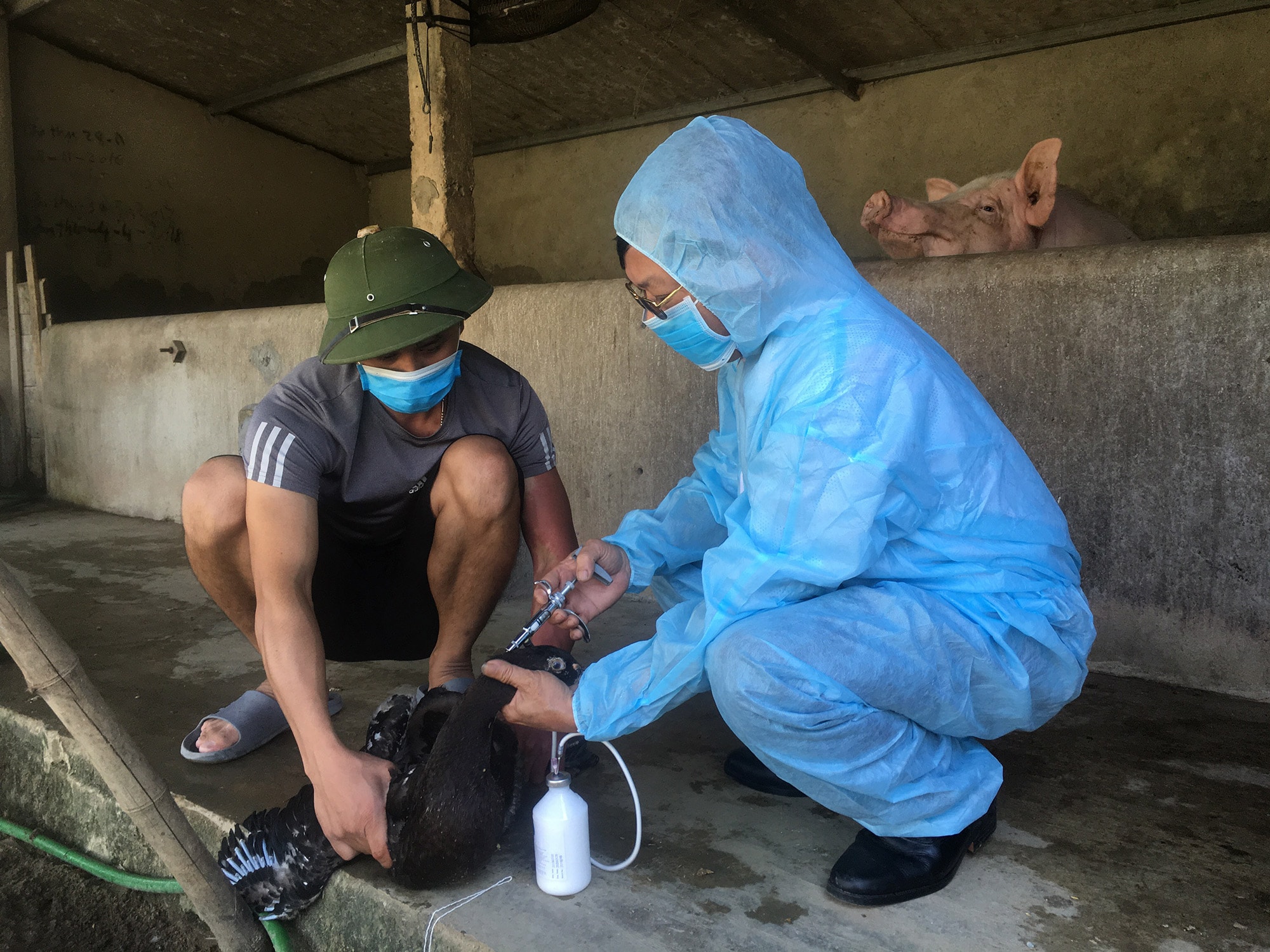 |
| Commune veterinary staff are always the leading force in vaccination and livestock development. Photo: Phu Huong |
No longer having a commune veterinarian means that there is no one to grasp and update the production situation, investigate and detect pests, leading to untimely, unrealistic, unsynchronized and ineffective disease prevention and control advice at the grassroots level. Diseases are slow to be detected, not promptly contained and controlled, so there is always a risk of widespread outbreaks.
“In 2019, the commune veterinary department closely followed the area, monitoring the epidemic to each livestock household, so livestock showing signs of disease were detected and treated immediately on a small scale. However, in 2020, outbreaks were often detected late because livestock farmers with sick livestock and poultry did not report to local authorities. When the authorities found out, it was too late, spreading to a large number; or when the animals died, people threw them into the environment, and the press reported, then the authorities found out,” Mr. Dang Van Minh shared.
Without a commune veterinarian, there is also no longer a "bridge" between the commune People's Committee and the district-level professional agency. There is no longer a network of specialized staff to directly direct, propagate, and guide pest prevention and control at the grassroots level.
Due to lack of human resources, the vaccination rate is low, the vaccination time is long, affecting the epidemiological situation and the vaccination schedule for the next crop; the vaccination rate of all types of vaccines is only 62 - 90% compared to the same period in 2019, the districts mainly vaccinate with vaccines supported by the State but the implementation is also very difficult, many districts and communes are not vaccinating, or implementing in response. In 2020, in the spring vaccination period, 84 wards and communes did not vaccinate livestock, 237 wards and communes did not vaccinate with avian influenza; in the autumn crop, 121 wards and communes did not vaccinate livestock, 418 wards and communes did not vaccinate with avian influenza.
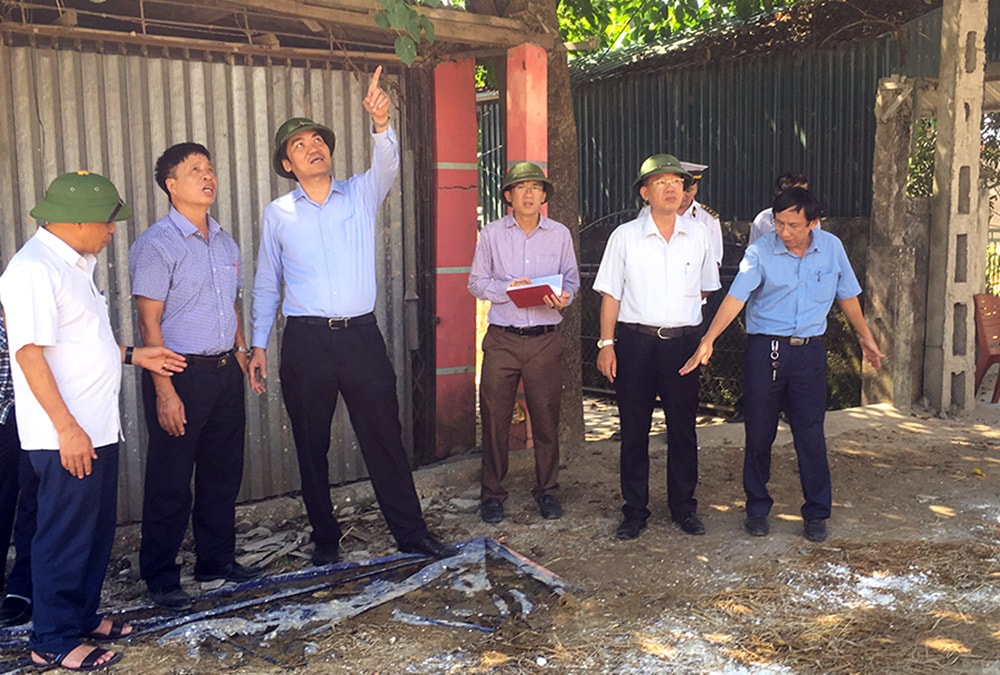 |
| Comrade Hoang Nghia Hieu - Member of the Provincial Party Committee, Vice Chairman of the Provincial People's Committee inspected the work of preventing African swine fever in Quynh Luu. Photo: Phu Huong |
In addition, slaughtering at facilities is not controlled, and the import of livestock and poultry into the locality is not monitored or managed. Nghe An has built and maintained 46 centralized slaughterhouses and about 70 small-scale slaughterhouses.
Previously, slaughter control was assigned to commune veterinarians, thereby controlling dangerous infectious diseases spread through slaughter. However, it is now very difficult to contract with them, and funding is insufficient. Most of the facilities operate without veterinary slaughter control, which significantly affects food hygiene and safety management, and the risk of disease spreading and outbreaks is very high. For example, in Yen Thanh district, there used to be 15 livestock slaughter facilities, but now only 6/15 facilities are still operating, the rest are closed due to lack of veterinary slaughter control.
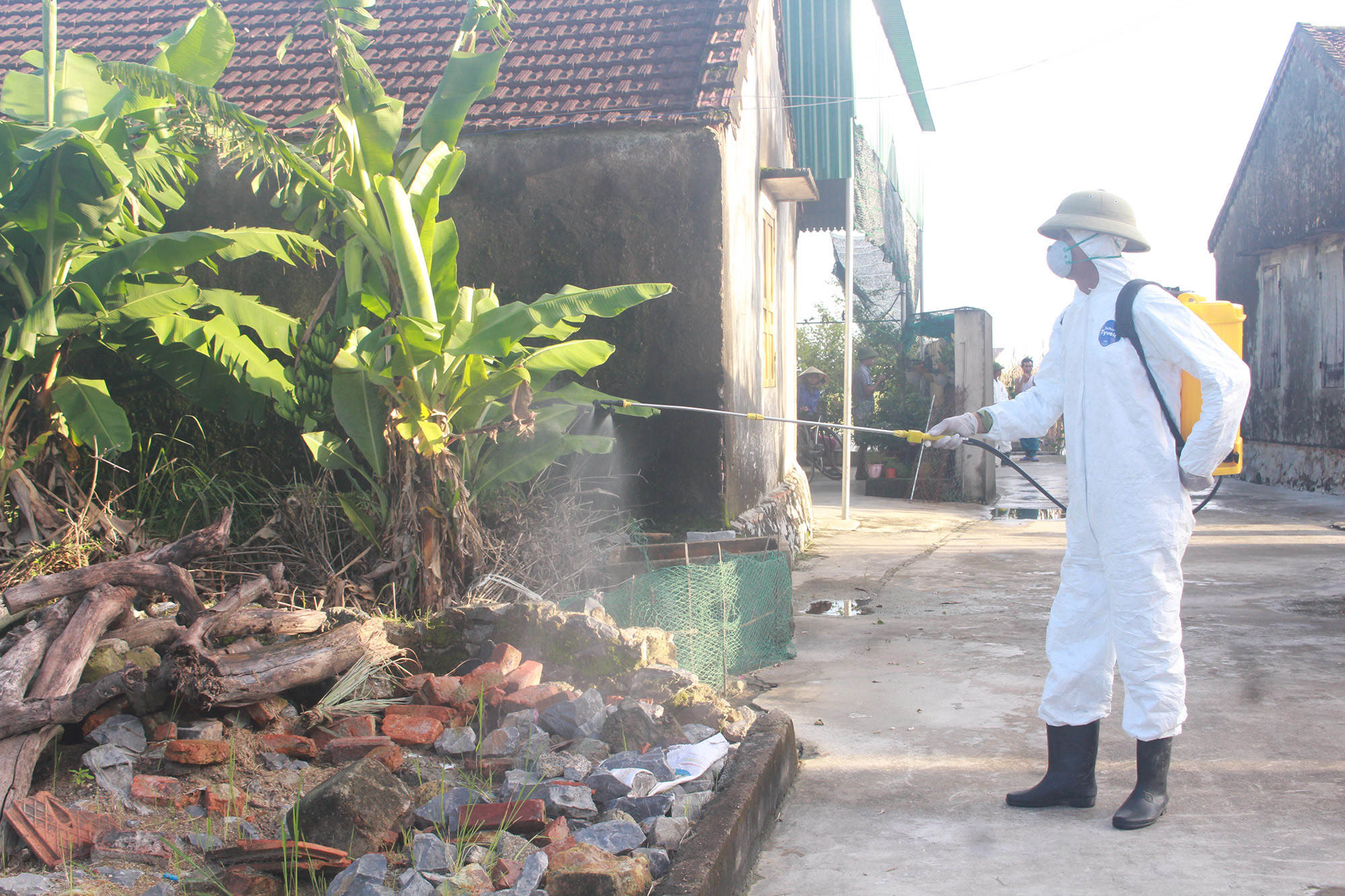 |
| Disinfectant spraying is an important measure in preventing and controlling epidemics in livestock and poultry. Photo: Phu Huong |
From the causes of the epidemic in recent times, nIn the coming time, the risk of VDNC, DTLCP, avian influenza,lfoot-and-mouth disease and other dangerous diseases in livestock and poultrycan spread widelyseriously affecting the socio-economy in the area.
______________________________
The continued arrangement of veterinary and plant protection positions has full legal basis. Article 6 of the Veterinary Law stipulates: Based on the requirements of veterinary activities in the locality and the ability to balance local resources, the People's Committees and centrally-run cities shall request the People's Councils of the same level to consider and decide on the arrangement of veterinary staff in communes, wards and towns.
Standards for commune-level veterinary staff are stipulated in Circular No. 29/2016/TT-BNNPTNT dated August 5, 2016 of the Ministry of Agriculture and Rural Development. As of the end of October 2020, 5/63 provinces and cities did not have commune veterinary staff, including Nghe An. Currently, the whole country has 15,791 people working in veterinary work, of which 9,756 are commune-level veterinary staff.
Along with that, the Politburo, Secretariat, National Assembly, Government and Prime Minister all have directives on strengthening veterinary forces at all levels in accordance with practical requirements and demands, to ensure conditions for disease prevention and control in livestock, poultry and aquatic products.
In this case, the Department of Agriculture and Rural Development is requested to report to the Provincial People's Committee to ask for opinions from the Provincial Party Standing Committee before asking for opinions from the Provincial People's Council to consider amending and supplementing Resolution No. 22/2019/NQ-HDND.
_________________________________
The current trend and the following years, forecasts of the total livestock herd increasing, international economic integration is constantly expanding; climate change is increasingly severe, leading to a decrease in livestock resistance; the risk of dangerous epidemics occurring is high. Meanwhile, although it is a very important economic sector, in Nghe An, household and small-scale livestock farming still accounts for over 80%.
In that condition, it is very necessary to have a force of commune veterinary staff to support the livestock industry, especially in mountainous, remote and isolated areas. The Veterinary industry is a specialized technical industry, if there is no professional person to perform at the facility, no one can do it for them. And when there is no supervision and implementation of disease prevention measures, the risk of dangerous epidemics in livestock is very high, affecting livestock development, causing food safety loss, economic losses for the people and the State.
Therefore, the Provincial People's Committee proposed that the Provincial People's Council consider amending the resolution and arranging non-professional positions at the commune level in charge of veterinary medicine in the coming time.
